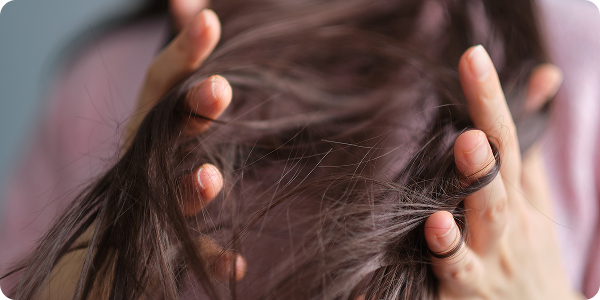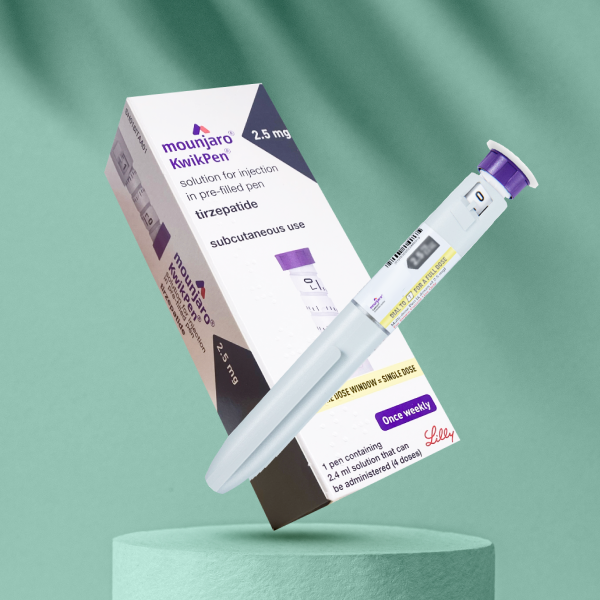
Rapid weight loss can be life-changing, but many people are surprised to discover that shedding pounds quickly can also mean shedding hair. If you’ve noticed increased hair thinning or loss during your weight loss journey, you’re not alone. Understanding the science behind this phenomenon can help you take proactive steps to protect your hair health whilst achieving your weight goals.
The Science Behind Medication-Induced Hair Loss
Hair loss during rapid weight loss is often caused by a condition called telogen effluvium (TE). TE occurs when your body experiences physiological stress such as rapid changes in weight, illness, surgery, or significant changes in diet.
Your hair growth cycle consists of three phases:
- Anagen phase: Active growth (2-7 years)
- Catagen phase: Transition (2-3 weeks)
- Telogen phase: Resting phase before shedding (2-3 months)
When your body experiences rapid changes from weight loss medications or extreme calorie restriction, it prioritises essential functions over hair growth. This stress response pushes more hair follicles into the telogen phase simultaneously, leading to noticeable thinning 2-4 months later.
The good news is that telogen effluvium is typically temporary and reversible once your body adjusts to the changes.

Common Weight Loss Medications That May Trigger Hair Thinning
There are 3 different weight-loss injections available on prescription in the UK: Mounjaro (tirzepatide), Wegovy (semaglutide) and Saxenda (liraglutide). While these medications are highly effective for weight management, there are occasional reports of hair thinning.
These GLP-1 receptor agonists can contribute to hair loss through several mechanisms:
- Rapid weight loss: Losing weight too quickly stresses hair follicles
- Reduced nutrient absorption: Changes in eating patterns may affect nutrient uptake
- Decreased appetite: Leading to inadequate protein and vitamin intake
Other weight loss medications that may affect hair include:
- Orlistat (available on NHS): Can reduce the absorption of fat-soluble vitamins (A, D, E, and K). In rare cases, deficiencies in these nutrients may contribute to hair thinning if dietary intake is insufficient.
It’s important to note that not everyone experiences hair loss with these medications, and the benefits often outweigh the temporary side effects.

Nutritional Deficiencies: The Hidden Culprit in Rapid Weight Loss
Nutritional deficiencies are often a common driver of hair loss during weight loss. Vitamins and minerals from food play an extremely important role in the hair follicle cycle and overall hair growth. Rapid weight loss can sometimes reduce your intake of important nutrients that support healthy hair growth. Key nutrients to pay attention to include:
- Vitamin B12
- Protein
- Vitamin D
- Biotin
- Riboflavin
- Iron
- Omega-3 and Omega-6 Fatty Acids
During rapid weight loss, calorie restriction combined with medication side effects can easily lead to nutritional deficiencies, even when following a seemingly balanced diet. It’s important to ensure that during your weight loss you continue to eat a balanced diet rich in vitamins and minerals that are vital for hair growth.

Protecting and Restoring Your Hair: Strategies for Healthy Hair Regrowth
Hair health and growth is important to lots of people and while the maximum speed at which your hair will grow is genetically determined, there are lots of ways to boost the overall health of your hair. We’re now going to talk through a few top tips that can help keep your hair healthy and happy.
Scalp Massaging and Cleanliness
A healthy scalp is vital as it provides the perfect environment for your hair to grow, and that means keeping your scalp clean and happy. Its important to regularly wash your head with shampoo to remove excess oils, sweat, and general dirt. You can also give yourself a deep scalp massage with the shampoo in your hair to help remove even more debris.
Using conditioner to soften hair
Dry, tough hair can be very brittle causing it to break easily, causing slow overall hair growth. An easy fix to this problem is to use a conditioner once or twice a week to help boost the overall softness and health of your hair.
Avoiding excessive heat treatment
It might sound obvious, but it’s important to minimise the amount of heat styling and treatment you do to your hair as it can lead to damage, dryness, and ultimately, slow your hair growth. Another tip is to avoid straightening wet hair as the moisture within the hair follicles can boil and cause the shaft to burst, forming microscopic nodules that may eventually cause the hair to break.
Stress Management
Being overstressed can cause a multitude of problems, one of which is putting your hair at risk of thinning or slowing its growth. If you are feeling extra stressed, you can try practicing meditation, yoga, or deep breathing exercises that might provide some relief.
Optimise your sleep schedule
Sleep helps restore your body and regulate stress and therefore is an extremely important factor when it comes to hair health. Ensuring that you have a good and regular sleep schedule is vital for combating stress-induced hair loss. Try to establish a consistent schedule and create a relaxing bedtime routine, keep your bedroom cool and dark, and aim to avoid screens at least an hour before bedtime.
When to seek professional help
Consult your GP or healthcare provider if you experience:
- Sudden and severe hair loss
- Hair loss accompanied by other symptoms (fatigue, skin issues, rashes)
- You don’t see any improvement even when your weight has stabilised
- Signs of scarring or patchy hair loss

Conclusion
Remember, in most cases hair loss during rapid weight loss is temporary. With proper nutrition, patience, and appropriate care, most people see their hair return to normal thickness within 6-12 months of achieving a stable weight. The key is maintaining a balanced approach to weight loss that prioritises both your overall health and hair wellbeing.
This article is intended for informational purposes only and does not constitute medical advice. Please consult with a healthcare professional for personalised medical guidance.











